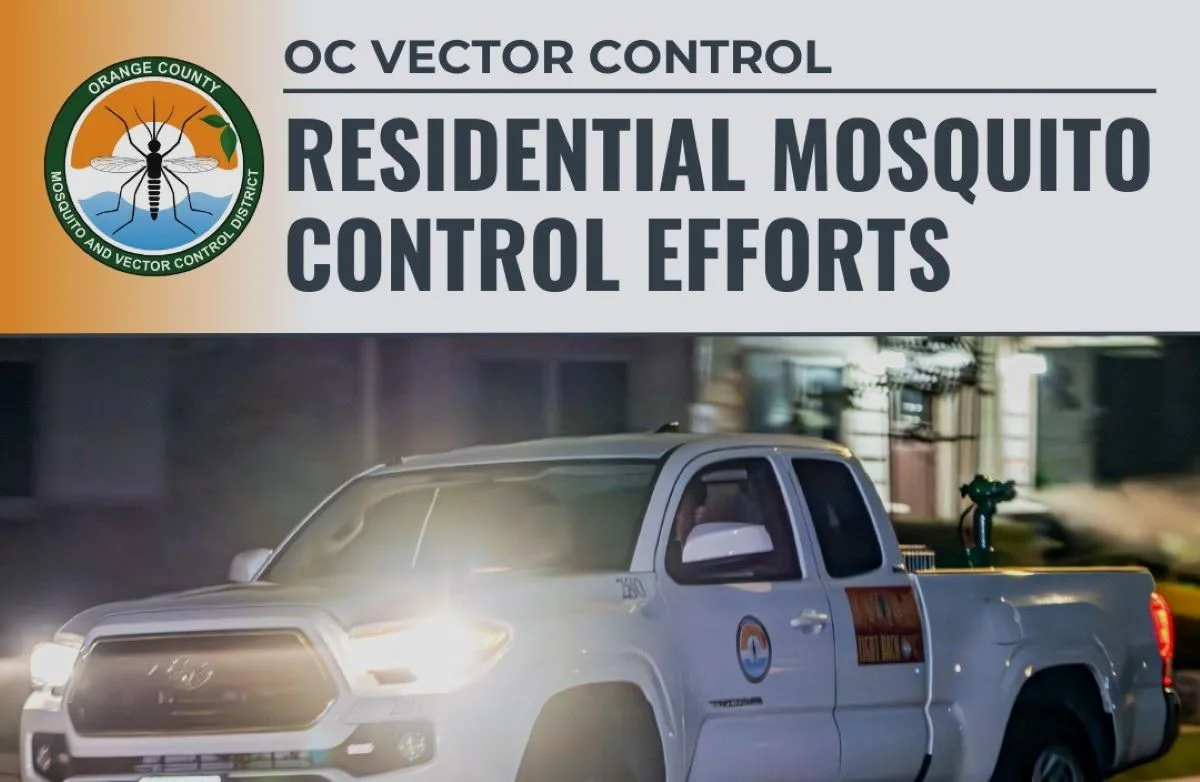The Orange County Vector Control District has announced upcoming mosquito control efforts to address an increase in mosquito abundance and the risk of mosquito-borne disease in the cities of Anaheim, Garden Grove, Santa Ana and Stanton.

OCMVCD is scheduled to conduct treatments on the dates and times below:
Santa Ana Treatment Application Dates and Times:
When: Wednesday – Friday | August 6th, 7th, and 8th
Time: Midnight to 5:00 a.m.
Treatment: Truck treatment with DeltaGard
Anaheim, Garden Grove and Stanton Treatment Application Dates and Times:
When: Wednesday – Friday | August 6th, 7th, and 8th
Time: Midnight to 5:00 a.m.
Treatment: Truck treatment with DeltaGard
If numbers persist or disease is present, treatments may continue throughout the biting season.
*Note: Additional times and dates could be added and are subject to change. If numbers persist or disease is present, treatments may continue throughout the biting season.
Reducing the population of adult mosquitoes with public health pesticides (adulticides) that are registered by the US Environmental Protection Agency (US EPA) will be done if necessary to prevent human illness or suppress a heavy nuisance infestation of mosquitoes.
The decision to use mosquito control applications either by truck-mounted, backpack or aircraft application equipment will be based on surveillance information or the documentation of West Nile virus or other mosquito-borne disease activity at a level that indicates a threat to human health.
Either Ultra-Low Volume (ULV) adulticide treatments or Wide Area Larvicide Spraying (WALS) treatments will be conducted in concentrated areas most at risk for disease occurrence or where travel-related mosquito-borne disease cases have been identified.
Visit this webpage to view an interactive map, where residents can enter an address to determine if they are in the treatment area.
Dangers of DeltaGard
DeltaGard is a mosquito control spray that contains deltamethrin, a synthetic pyrethroid insecticide. While it’s effective at killing mosquitoes, there are several potential downsides and risks associated with its use—for humans, pets, and the environment:
Health Risks to Humans
- Skin Sensitization: DeltaGard may cause allergic skin reactions. Users are advised to wear protective gloves and avoid skin contact.
- Inhalation Hazards: Breathing in mist or spray can irritate the respiratory system. It’s important to avoid inhaling the product during application.
- Neurotoxicity: Animal studies have shown that deltamethrin can cause neurobehavioral effects and neuropathological changes, including transient hyperactivity typical of pyrethroid neurotoxicity.
Environmental and Wildlife Impact
- Broad-spectrum Toxicity: Pyrethroids like deltamethrin are not selective—they kill a wide range of insects, not just mosquitoes. This includes beneficial species such as:
- Honey bees and solitary bees
- Butterflies, fireflies, and monarch caterpillars
- Spiders, mites, and other arthropods
- Impact on Birds and Fish: Birds that feed on insects may suffer from reduced food availability. Pyrethroids are also highly toxic to fish and can contaminate water bodies through runoff.
- Pet Sensitivity: Cats are particularly vulnerable due to a lack of liver enzymes needed to detoxify pyrethroids, potentially leading to pyrethroid toxicosis.
Persistence and Residual Effects
- Pyrethroids can remain active on surfaces for weeks to months, especially in shaded areas. This prolonged activity increases the risk of exposure to non-target organisms.
Regulatory and Safety Considerations
- Users should follow strict safety guidelines, including wearing protective gear, avoiding contact with treated surfaces, and ensuring pets and children are kept away during and after application.
Here’s a summary of more environmentally friendly ways to control mosquitoes:
1. Natural Repellents and Plants
- Use plants like citronella, lavender, marigolds, basil, lemongrass, and rosemary.
- Spray essential oils like lemon eucalyptus or peppermint mixed with water.
2. Biological Controls
- Install bat houses to attract bats that eat mosquitoes.
- Add mosquitofish to ponds—they eat mosquito larvae.
3. Water Management
- Remove standing water from birdbaths, plant saucers, and gutters.
- Use mosquito dunks with BTI, a natural bacterium that kills larvae but is safe for pets and wildlife.
4. DIY Yard Sprays
- Garlic spray: blend garlic with water and spray around the yard.
- Vinegar or apple cider vinegar sprays can also repel mosquitoes.
5. Physical Barriers and Devices
- Install fine-mesh screens on windows and doors.
- Use mosquito nets and outdoor fans.
- Set up mosquito traps using sugar and yeast or CO₂.
6. Landscape and Habitat Design
- Trim tall grass and dense vegetation.
- Create windbreaks with hedges or trellises to disrupt mosquito flight paths.


Where in Santa Ana??
There is a map embedded in the post and a link to a Vector Control site where you may access that map.